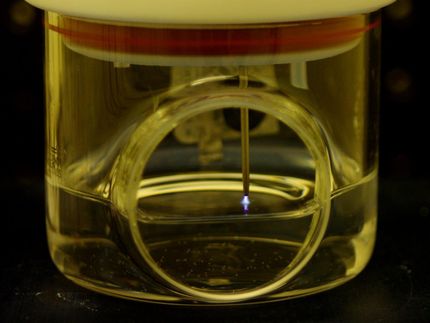Storing carbon dioxide deep underground in rock form
Advertisement
As carbon dioxide continues to burgeon in the atmosphere causing the Earth's climate to warm, scientists are trying to find ways to remove the excess gas from the atmosphere and store it where it can cause no trouble.
Sigurdur Gislason of the University of Iceland has been studying the possibility of sequestration of carbon dioxide (CO 2 ) in basalt and presented his findings today to several thousand geochemists from around the world at the Goldschmidt Conference hosted by the University of Tennessee, Knoxville, and Oak Ridge National Laboratory.
Carbon sequestration is currently the most promising way to reduce greenhouse gases. Gislason leads an international team of scientists on the Carbfix Project, which aims at pumping carbon deep underground in southwest Iceland where it will mix with minerals and become rock. The project's goal is to find a storage solution that is long lasting, thermodynamically stable and environmentally benign.
An Icelandic geothermal plant is now hosting the pilot program. Gislason's project involves capturing and separating flue gases at the Hellisheidi Geothermal Power Plant, transporting the gas, dissolving it in water, and injecting it at high pressures to a depth between 400 and 800 meters into a thick layer of basalt. Then he and his coworkers will verify and monitor the storage.
Carbon dioxide mixed with water forms carbonic acid (also known as carbonated water or soda water), which percolates through the rocks, dissolving some minerals and forming solid carbonates with them, thereby storing the carbon dioxide in rock form, said Gislason.
If successful, Gislason said, the experiment will be scaled up and can be used wherever carbon dioxide is emitted. Currently, carbon may be captured as a byproduct in processes such as petroleum refining. It can be stored in reservoirs, ocean water and mature oilfields. However, many experts fear that CO 2 may leak over time. Storage of CO 2 as solid magnesium carbonates or calcium carbonates deep underground in basaltic rocks may provide a long-term and thermodynamically stable solution.
Most read news
Topics
Organizations
Other news from the department science

Get the chemical industry in your inbox
By submitting this form you agree that LUMITOS AG will send you the newsletter(s) selected above by email. Your data will not be passed on to third parties. Your data will be stored and processed in accordance with our data protection regulations. LUMITOS may contact you by email for the purpose of advertising or market and opinion surveys. You can revoke your consent at any time without giving reasons to LUMITOS AG, Ernst-Augustin-Str. 2, 12489 Berlin, Germany or by e-mail at revoke@lumitos.com with effect for the future. In addition, each email contains a link to unsubscribe from the corresponding newsletter.




























































